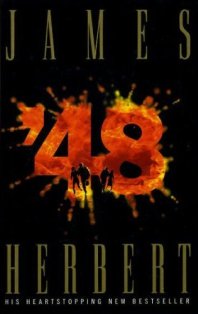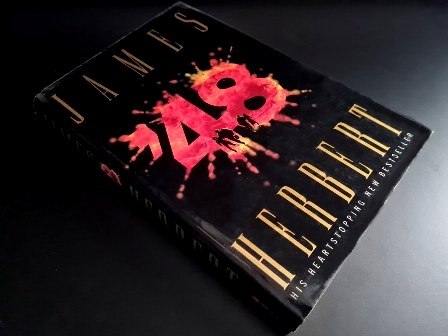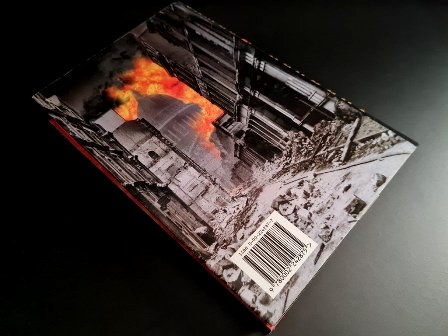
First published back in November of 1996, British author James Herbert’s eighteenth novel simply entitled ‘’48’ returned once again to another bleak post-apocalyptic setting, this time playing with the notion of an alternate history.
DLS Synopsis:
With the end of WWII came the end of everything as we knew it. Before his eventual defeat, Adolf Hitler set in motion the near-complete annihilation of mankind. Using biological weapons in the shape of V2 missiles, the German army, under the immediate direction of Hitler, unleashed the Blood Death upon the world. The vast majority of the world’s population were instantly killed by the disease. Others were subjected to a much worse fate. Dubbed the ‘Slow Death’, many of the few remaining survivors were faced with a slow and painful demise as their bodies broke apart from the horrific effects of the disease.
Of those that remained, those fortunate to have an AB negative blood-type appeared to be largely unaffected by the disease. Of this small number is American fighter pilot Eugene Hoke. Dedicated to serving his country, Hoke had signed up to fight the advancing Nazi army before America itself hadn’t even stepped up to the threat.
Three years on, the year is now 1948 and the world is a very different place. In what had been the great city of London, Hoke has been holed-up in the once luxury Savoy hotel, living out his days with his dog, Cagney, in constant fear for his life from the marauding threat of the Blackshirts.
Under the command of Lord Hubble, his small army of loyal Blackshirts have been scouring the desolate city of London in the hope of capturing Hoke. Suffering from the hideous effects of the Slow Death, Hubble believes that Hoke’s AB negative blood will provide the key to a cure – if it could be harvested by a life-draining blood transfusion. But finding and capturing the American pilot isn’t that easy. And when Hubble does eventually succeed, his fascist army would never have anticipated Hoke being rescued by three fellow AB negative survivors – two women and a German navigator no less.
The hunt is now on for Hoke, the German POW survivor Wilhelm Stern, and the two friends Muriel Drake and Cissie. The four must run, hide and ultimately fight in order to stay alive.
Mere day-to-day survival in this dying post-apocalyptic world continues to be a bitter struggle thwart with danger waiting round almost every corner. Those that are dying from the Slow Death have become desperate. Desperation quickly leads to violence. And keeping hold of any degree of sanity is a battle in itself....
DLS Review:
Hebert’s return to a post-apocalyptic setting is an absolute avalanche of fast-paced desperate action and edge-of-the-seat energy from the very outset. Indeed, Herbert starts off the tale thrusting the reader right into the thick of it all, with Hoke fleeing for his life through the empty streets of London. From here the tension and ever present threat of the Blackshirts is constantly at the reader’s heels. The foot constantly on the accelerator as Herbert keeps on charging forwards with Hoke’s single-minded aim to survive.
The ravaged post-apocalyptic backdrop is portrayed in such a vividly brutal manner, with the emptiness and utter isolation contrasting starkly with the sudden bursts of adrenaline-fuelled danger. Rubble lined streets and crumbling buildings have become the home of those few remaining survivors. Much like with the setting of Herbert’s earlier novel ‘Domain’ (1984), his descriptions of a crumbling cityscape provide a masterclass in setting down an atmospheric and inherently oppressive post-apocalyptic premise.
Clearly heavily influenced by Richard Matheson’s classic ‘I Am Legend’ (1954), the novel utilises the close bond between man and dog in an otherwise lonely and uncaring world. This close relationship is exploited to its full potential by Herbert, engaging the reader with the strong emotional connection and pulling on the reader’s (hopefully) sympathetic heartstrings.
The injection of a love interest between Hoke and Drake adds a somewhat welcome warmth to the otherwise blanket effect of the downbeat and gritty premise. However, Herbert knows his principal audience, and so cranks this aspect up a couple of notches by throwing in a double-act of graphically sleazy sex scenes to keep the tale travelling along an unashamedly pulpy path.
Characterisation is somewhat skipped over as a rule, other than with the principal protagonist of Hoke. In Hoke we see a veritable multitude of conflicting character traits, with a painful inner-turmoil and questionable sanity (potentially on the very brink of collapse) forming an excellent underlying substory. Indeed, the similarities between the characters of Eugene Hoke and Robert Neville from ‘I Am Legend’ (1954) are numerous on such characterisation indulgent qualities.
The outrageous use of heart-pumping action and unrelenting violence forces the reader to sit up and take note of everything that transpires in the tale. Herbert tackles the use of excessive violence head on, with Hoke’s unmoveable hatred for ‘the enemy’ veering further and further towards a matter of an increasingly questionable sanity. Could there and should there be an end to the violence? Do so many of those that have come through the Blood Death need to die so unnecessarily? The mayhem and blood drenched carnage forces a barrage of questions to the surface, the majority of which Herbert addresses in his own brutal and unsympathetic way.
The novel’s ending and ultimate finale is as explosive and dramatic as the rest of the tale that preceded it. After a heart-wrenching twist, the bloodspill feels justified and absolutely warranted; with the final showdown brought to a suitably grand final sequence.
All in all the novel delivers an absolute tirade of thrills and spills from start to finish. Herbert goes at the action and explicit violence like a hell-bent man on a mission. It’s chaotic and bleak. Energetic and unashamedly pulpy. There’s hardly a page that goes by without the reader being completely swallowed up by the sheer post-apocalyptic desperation of the novel. One of Herbert’s very finest offerings to date.
The tale runs for a total of 330 pages.

© DLS Reviews









